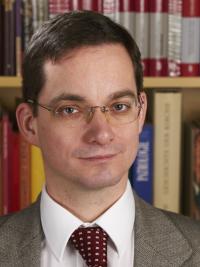Harald Buchinger
Chant’s Imagined Past
The performance of chant and its scholarly investigation has always gone along with a generous dose of historical imagination: not only were the 19th-century restoration and 20th-century ecclesial legislation guided by quite anachronistic views, but the introduction and propagation – and, to a certain degree, the actual creation – of “Gregorian” chant in the early medieval West made use of a wide variety of strategies to suggest that it had originated in the then already somewhat mythical Rome of the great pope Gregory. Yet even the Roman core repertoire itself seems to display traces of an imagined past no longer prevalent at the time of the repertoire’s redaction and certainly did not match later liturgical conditions. The paper will discuss the various levels of imagination which can be discerned in the history of chant and is thus intended to contribute to critical reflection upon its past and present, and even perhaps its future.
 Harald Buchinger is professor of Liturgical Studies at the University of Regensburg in Bavaria. Having obtained a diploma in Church Music, he studied Theology in Vienna and Jerusalem (Mag. theol., Dr. theol., Vienna University), and spent three years in Rome engaged in post-doctoral studies and research. Having lectured at various universities, notably in Jerusalem and Leuven, he was an ISM Fellow in Music, Worship, and the Arts and Visiting Professor of Liturgical Studies at Yale University in 2012–13. His research focuses on the reception of the Bible in liturgy, including Chant, on the relationship between Christian and Jewish liturgy, and on the development of the liturgical year.
Harald Buchinger is professor of Liturgical Studies at the University of Regensburg in Bavaria. Having obtained a diploma in Church Music, he studied Theology in Vienna and Jerusalem (Mag. theol., Dr. theol., Vienna University), and spent three years in Rome engaged in post-doctoral studies and research. Having lectured at various universities, notably in Jerusalem and Leuven, he was an ISM Fellow in Music, Worship, and the Arts and Visiting Professor of Liturgical Studies at Yale University in 2012–13. His research focuses on the reception of the Bible in liturgy, including Chant, on the relationship between Christian and Jewish liturgy, and on the development of the liturgical year.